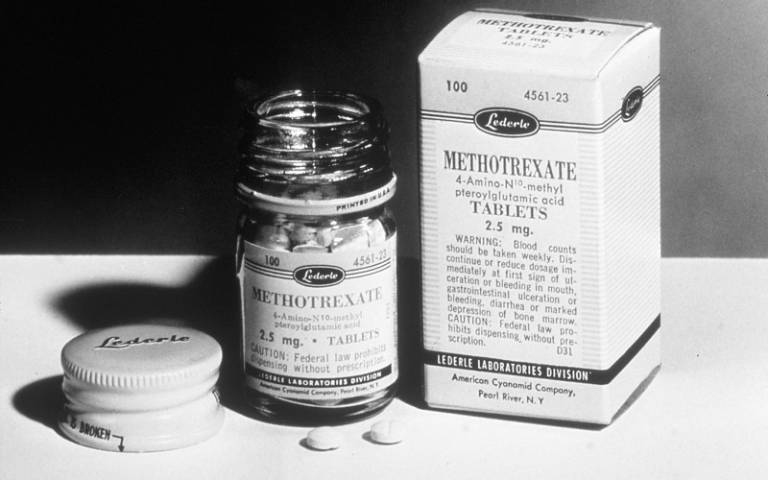Immunosuppressants do not increase Covid-19 risk for people with rheumatic diseases
4 June 2020
Most people with rheumatic diseases such as arthritis can recover from Covid-19, as the immunosuppressant medications they take do not appear to increase hospitalisation risk, finds an international study involving UCL.

But one type of medication may increase the risk of hospitalisation, suggesting caution is needed, according to the study published in Annals of the Rheumatic Diseases.
The study comes out of a new initiative led by Dr Pedro Machado (UCL Queen Square Institute of Neurology and UCL Centre for Rheumatology), the European Register of COVID-19 disease in patients with rheumatic diseases, sponsored by the European League Against Rheumatism (EULAR). The findings were presented today at the EULAR e-congress.
The initiative was launched to pool resources across Europe in order to find out if people with rheumatic diseases, who take medication intended to suppress their rogue immune systems which can attack their own bodies, are particularly vulnerable to Covid-19. The researchers are now part of a global network of rheumatologists sharing data in an international COVID-19 registry, the Covid-19 Global Rheumatology Alliance.
Dr Machado, co-senior author of the new paper and Chair of the EULAR Standing Committee on Epidemiology and Health Services Research, said: "There is an urgent need to understand the outcome of patients who have been infected with SARS-CoV-2 while at the same time receiving steroids, synthetic or biological disease-modifying anti-rheumatic drugs and nonsteroidal anti-inflammatory drugs.
"This will support rheumatologists and other health care professionals, such as specialist nurses, in advising their patients and improving their care."
The research team analysed data from 600 people with rheumatic diseases such as arthritis and lupus, who were infected with COVID-19, in 40 countries. They investigated the impact of the choice of rheumatic disease therapy on potential hospitalisation for COVID-19.
Data on outcomes of COVID-19 in patients with rheumatic conditions are still rare and limited to small numbers of cases. Patients with rheumatic diseases are concerned about the extent to which their condition increases the risk of a severe case and the impact of the intake of their immunosuppressants on this.
EULAR President Professor Dr Iain B. McInnes from Glasgow, Scotland, United Kingdom explained: "There is considerable uncertainty about the drug management in the context of rheumatic conditions."
Less than half (46%) of the patients studied required hospitalisation, while 55 fatalities (9% of patients) occurred. The researchers caution that these figures should not be interpreted as the true rate of hospitalisation and death among patients with rheumatic disease infected with SARS-CoV-2. Due to the way case information is collected, severe cases are more likely to be reported to the database, therefore artificially increasing the rate of hospitalisation and death in the group of reported patients.
The researchers found that the intake of conventional disease-modifying antirheumatic drugs (csDMARDs) – such as anti-malarial drugs or methotrexate – alone or in combination with biologics (e.g. TNF-alpha inhibitors), or the intake of nonsteroidal anti-inflammatory drugs (NSAIDs) was not associated with hospitalisation. The intake of TNF-alpha inhibitors was associated with a reduced probability of hospitalisation.
Treatment with more than 10 mg prednisone per day – corresponding to a moderate to high dose – was associated with a higher probability of hospitalisation. Prednisone is a glucocorticoid frequently used in rheumatology as a fast-acting anti-inflammatory drug.
Professor John Isaacs (University of Newcastle), Scientific Chair of the EULAR Scientific Committee, added: "The study shows that most patients with rheumatological conditions recover from COVID-19 – independent of the medication they receive.
"It is necessary, however, to gather more knowledge about the course of an infection with the novel coronavirus in patients with inflammatory rheumatic conditions."
Links
- Research paper in Annals of the Rheumatic Diseases
- Dr Pedro Machado’s academic profile
- UCL Queen Square Institute of Neurology
- UCL Centre for Rheumatology
- European Register of COVID-19 disease in patients with rheumatic diseases
- Covid-19 Global Rheumatology Alliance
Image
- Historical image of methotrexate pills. Credit: National Cancer Institute, Source: Wikimedia Commons
Source
Media contact
Chris Lane
Tel: +44 (0)20 7679 9222
Email: chris.lane [at] ucl.ac.uk
 Close
Close

